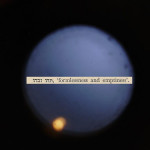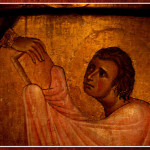We run our website the way we wished the whole internet worked: we provide high quality original content with no ads. We are funded solely by your direct support. Please consider supporting this project.

When the Bible Becomes an Idol
In John 5, we read about Jesus confronting some religious leaders saying, “You study the Scriptures diligently because you think that in them you have eternal life. These are the very Scriptures that testify about me, yet you refuse to come to me to have life” (John 5:39-40). These leaders thought they possessed life by diligently studying Scripture. What made these leaders feel accepted, worthwhile, and secure before God was that they knew their Bible and were confident they embraced the only true Bible-based beliefs.
Jesus, of course, wasn’t suggesting there was anything wrong with their diligent study of Scripture or with the rightness of their Bible-based conclusions. As a matter of fact, these leaders were more or less orthodox by first-century Jewish standards. More importantly, however, Jesus didn’t dispute the rightness or wrongness of their beliefs, because the issue wasn’t about what these leaders believed: he disputed the way they believed it.
Jesus responded to them by pointing out that all Scripture is intended to point to him (John 5:46), the one true source of life. He was trying to get them to see that there is no life in knowing the Bible and embracing Bible-based beliefs unless they lead to him. Yet by trying to wring life out of things that have no life apart from Christ, these leaders made an idol out of the Bible and their Bible-based beliefs.
There’s a demonic self-reinforcing quality about idolatry that can be discerned in these leaders. By trying to derive false life from their confident knowledge of Scripture instead of the One Scripture points to, these leaders had made an idol of their knowledge of Scripture. But the river also flowed in the other direction. Precisely because these leaders had made an idol of their knowledge of Scripture, they would not come to the true source of life to which Scripture points.
So these leaders were not hungry for the true bread of life (Jn 6:32-58) because they had already stuffed themselves with the false life of their idol. And they had to stuff themselves with this false life of their idol because they would not come to the true bread of life. It’s a vicious, idolatrous, self-reinforcing cycle that these religious experts were caught in. And the idols that trapped them, we must remember, were something that looked very spiritual: they diligently studied Scripture. They believed the right things. This is what made them confident they were okay with God.
This episode demonstrates that the way we believe what we believe can transform what we believe into an idol that actually blocks us from getting life from Christ—even when what we believe is completely true! And this happens whenever we are confident we’re okay with God because of what we believe rather than because of our relationship with the one true source of life. If what makes us feel okay with God is our confidence in the correctness of our beliefs, then our confidence in our beliefs is, in effect, our god.
—Adapted from Benefit of the Doubt, pages 55-56.
Image by MattLake via Flickr.
Category: General
Tags: Bible, Religious Idolatry
Topics: Biblical Interpretation
Related Reading

N.T. Wright on the Whole Sweep of Scripture
Here’s a really fine video message from N.T. Wright on how to read Scripture. So many of the misunderstandings we take away from Scripture happen when we pick out a verse here and there and neglect the whole story. We hope this will bless you and encourage you to “press your nose against the window.”

Pre-Modern Readings of Genesis 1
Biologos posted a three part reflection on Pre-Modern readings of Genesis 1 that are worth a closer look. And no matter what your particular way of reading this portion of Scripture, let’s pay attention to what edifies the Church and whether our reading contributes to that. From Part I of the series: Key theologians of…

Anti-American?
Kurt Willems posted a response to the accusation he often gets that he’s anti-American. He also included a video of Greg giving his own response to this question. Take a look! From Kurt’s blog: I am not, in any way, anti-American. In fact, I’m not anti-anyone. I believe that the way of Jesus compels us…

The Way We Disagree Matters
Rachel Held Evans posted her reflections on the ways we interact over differences in Biblical interpretation. It’s an important topic as we live out the kingdom among one another in our polarizing environment. How do you maintain a Christ-like posture when you are attacked or when others question your devotion to Christ when you express…

The One True Image of God: God’s Self-Portrait, Part 4
This point is emphasized throughout the New Testament because, if we don’t get this, we are left to our own imaginations about God, and we’ll draw from a multitude of different sources to construct a mental picture of God that will, to one degree or another, fall short of the beauty of the true God…

Part 3: Disarming Flood’s Inadequate Conception of Biblical Authority
Image by Ex-InTransit via Flickr In this third part of my review of Derek Flood’s Disarming Scripture I will offer a critique of his redefined conception of biblical inspiration and authority. I will begin by having us recall from Part I that Flood holds up “faithful questioning” over “unquestioning obedience” as the kind of faith that Jesus…
